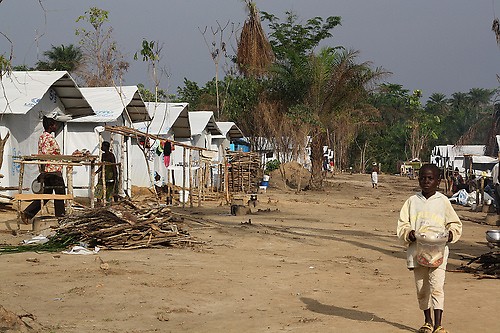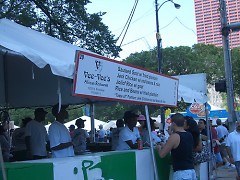The sun has set, the evening breeze offering a welcome relief from the merciless heat of the long day. Real solitude has been hard to find these past six months, surrounded in a foreign land by the noise and crowding of thousands of fellow displaced people, but in the moonlight everything is still, seeming almost peaceful as the others sleep. This brief respite provides a rare chance to think and dream of better things for one’s family, if only that miracle would come.
This may not be your story. But for 42 million people worldwide who have been displaced from their homeland because of violence, this is reality. The International Rescue Committee website (www.rescue.org) is filled with stories about them. This number is greater than the population of Canada, which in mid-2010 was reported to be 34.2 million by the Population Research Bureau (www.prb.org). These millions of displaced persons around the world could constitute their own nation. This nation would be quite diverse, primarily from Africa but with Asia, Eastern Europe, and both South and Central America significantly represented. However, gender and age in this nation would be anything but diverse; women and children would make up 80 percent of the population.
Though this ‘nation’ helps make the International Rescue Committee’s statistics clearer and more powerful, it obscures the complexity and chaos that allows millions of people to remain adrift and unseen by many in developed countries. The reality for millions of displaced people is that only a third of them manage to escape the persecution and unrest in their homeland and become official refugees in another land. The other two thirds remain behind, uprooted in their countries as internally displaced persons. For the 12 million or so people fortunate enough to obtain refugee status and remain in refugee camps, their trials are far from over. Refugee camps are not meant as a permanent solution for displaced persons, yet the vast majority of refugees find themselves stranded in refugee camps, not for months, but years, forced into dependence on international aid and camp staff for food, water, shelter, and clothing since they are not allowed to leave the camps to seek employment.
If a refugee wants to live outside the refugee camp, he or she must try to obtain a hearing with a United Nations High Commissioner on Refugees (UNHCR) officer. If they are fortunate enough to get a hearing, they must plead their case and attempt to convince this stranger that they have reasonable cause to believe that they cannot return home for fear of persecution or death. If the officer accepts their claim, they may be able to obtain legal permission to become a permanent resident in the country of asylum, or to be resettled in a third country that is willing to admit refugees. For the few refugees that make it this far, resettlement in a third country gives refugees the hope and opportunity of piecing their lives back together and starting anew.
This is where the United States comes into the picture. The U.S. is one of 22 countries worldwide that will accept refugees. In 2009, the United States admitted 60,191 refugees, making the U.S. one of the strongest leaders in refugee resettlement. When thinking of American areas known for their refugee populations, cities like New York, Los Angeles, even Detroit, come to mind. While these large cities do host a significant portion of the refugees who are admitted into the U.S., smaller cities like Grand Rapids, Michigan, also have a reputation for welcoming those who have been forced from their homelands. Thousands of refugees have made this area their final stop in a long and difficult journey from oppression and terror to freedom and hope. Their presence is evident in the diversity of faces and languages we see and hear here all around us in the Grand Rapids community.
When Grand Rapids-bound refugees step off their planes at Gerald R. Ford International Airport, the extent of their personal belongings are often the clothes they are wearing or what few things they were able to carry while fleeing from their home countries. The U.S. government does allocate funds for the purpose of helping refugees resettle, but to obtain these limited funds refugees must immediately begin seeking employment. Most refugees are eager for a chance to provide for themselves and their family, but those who are from rural developing countries, have known only farming, and speak little or no English, taking this abstract concept of finding and holding on to a job and turning it into a reality in an unknown land is incredibly difficult. The little things we Americans take for granted, such as reading, writing, American cultural customs and taboos, must be conquered first before refugees can successfully obtain employment. Fortunately, organizations like Lutheran Social Services of Michigan are here to help.
The Refugee Services division of Lutheran Social Services of Michigan (LSSM) is affiliated with Baltimore-based Lutheran Immigration and Refugee Services (LIRS), one of 10 national organizations contracted by the U.S. government to assist in refugee resettlement here in the United States. The Grand Rapids office of Lutheran Social Services is also a site for Episcopal Migration Ministries, another volunteer agency that works with recently arrived refugees in America. LSSM workers and volunteers are the refugees’ first contact when they arrive, meeting them at the airport, arranging housing, and providing them with immediate household supplies. LSSM continues to directly work with refugees throughout the period of six to eight months. They offer programs such as Match Grant, which provides incentives for seeking employment, and other employment services such as résumé writing and connecting refugees with potential employers. LSSM also assists with enrolling children in school, helping refugees navigate the application process for Social Security cards and other essential documents, providing refugees with a furnished house or apartment, assisting in cultural and social integration, referring refugees to training in English as a Second Language (ESL classes), and doing everything possible to assist in family reunification.
More than being the conduit for funds allotted by state and federal governments for refugee resettlement, LSSM workers and volunteers are a physical presence in the lives of refugees. They are there to lend a hand, provide a shoulder to lean on, and to be a friendly face and welcoming neighbor for these strangers who have made our community their new home. Although the ultimate goal of Lutheran Social Services of Michigan is to help each refugee become economically self-sufficient, another equally important goal is to make our new neighbors feel welcome and encourage them toward becoming thriving members of the Grand Rapids community. One can see the social vibrancy that refugees have contributed to our city; whether it be through ethnic restaurants or in adding new, bright hues to the city’s cultural palate, our refugees are what help make Grand Rapids the colorful, diverse, and great city that it is.
The situations that lead to the mass displacement of millions are complex. We may feel that the issues are too insurmountable for people like you and me to make a difference. But individuals can make the greatest impact, especially in the Grand Rapids community. This week is a very important week in the world of refugee assistance. Monday, June 20, 2011, marked the global celebration of World Refugee Day, with Grand Rapids planning its own local celebration of this international event in Garfield Park, 11 a.m. to 4 p.m. Saturday, June 25. This free event to raise awareness about the plight of refugees is open to the public and will feature speakers, live music and performers, food vendors and crafts for sale. Lutheran Social Services of Michigan will be there along with representatives of other West Michigan refugee services that commit time and resources to supporting these newcomers in the community. Everyone is invited to learn more about our refugees and what you can do to help.
In anticipation of this week-long celebration and awareness of refugees, Senator Patrick Leahy (D-VT) and Representative Zoe Lofgren (D-CA) introduced the Refugee Protection Act of 2011 into the U.S. House of Representatives on Wednesday, June 15th. This legislation would implement critical reforms to current American refugee policy, doing away with the one-year deadline for asylum application and allowing children separated from their parents to reunify with other family members who are acting as caretakers. The Refugee Protection Act legislation is supported by more than 40 organizations that support and advocate for fair refugee and asylum policies. The Senate bill is cosponsored by Senators Carl Levin (D-MI), Daniel Akaka (D-HI), and Dick Durbin (D-IL.). Please write to your legislators in Washington and encourage them to vote yes on this bill.
Refugee awareness, assistance, and policy is rarely in the spotlight, so we urge you to take this opportunity to recognize the refugees among us, the contributions they make to the Grand Rapids community, and the ways you can get involved by joining in the celebration, advocating, or volunteering. With seven new refugees arriving in Grand Rapids this coming month, you can make a “world of a difference” for someone in need right here in your own community.
If you are interested in volunteering, making a monetary contribution, or just want more information, please contact Dana Doll at [email protected].
The Rapidian, a program of the 501(c)3 nonprofit Community Media Center, relies on the community’s support to help cover the cost of training reporters and publishing content.
We need your help.
If each of our readers and content creators who values this community platform help support its creation and maintenance, The Rapidian can continue to educate and facilitate a conversation around issues for years to come.
Please support The Rapidian and make a contribution today.



Comments
With so many new programs and projects starting up revolving around the local food movement, I was wondering if any refugee farmers were being connected to any new jobs in agriculture? In particular, I am thinking of Michigan's Good Food Charter, and the need for more agriculturally diverse farms in order to provide enough organic produce to supply large industries such as hospitals and schools. If nothing else, it seems that there is room for more community garden plots to promote self sufficiency. I have met a refugee who has said that he would love to have a little plot of land: from the time he was a little boy he was learning to be a farmer, but here, he is working in a factory. This seems to be a huge waste of resources and knowledge, when the time is ripe to make use of them!
Teresa,
Thank you so much for reading and for your input. We're strong believers in asset-based refugee resettlement, which only works through a dedicated community. We wish we had even more brilliant feedback like yours! I really like your point and the direction you're going in. I wish we could have a full-time community liason that would work specifically with educating West Michigan employers on the valuable gifts of refugees. Our caseworkers and employment specialists can do this job in part, but unfortunately the bottom line is always making sure the client has a job as soon as possible. I'm glad you also have the creative vision to see the benefits of refugees to our community, let's work together to recruit more employers to see the same thing! As far as the gardening goes, I agree wholeheartedly. Have you seen the plots at Holy Cross Episcopal and Grand Rapids International Fellowship? Very impressive. I don't know the details of the Good Food Charter so I'm thankful for the suggestion. One of our biggest barriers to work like this is transportation, since most refugees have to find employment along the bus line.
Thanks again for your feedback! We appreciate it!